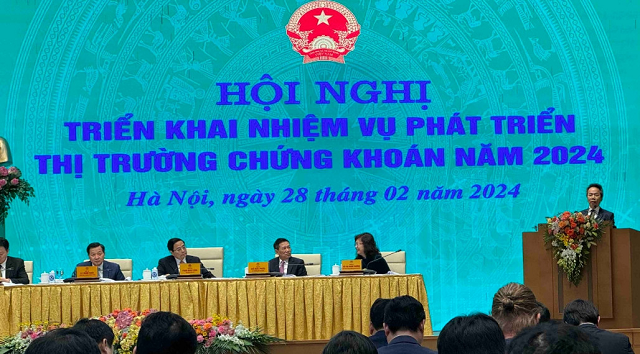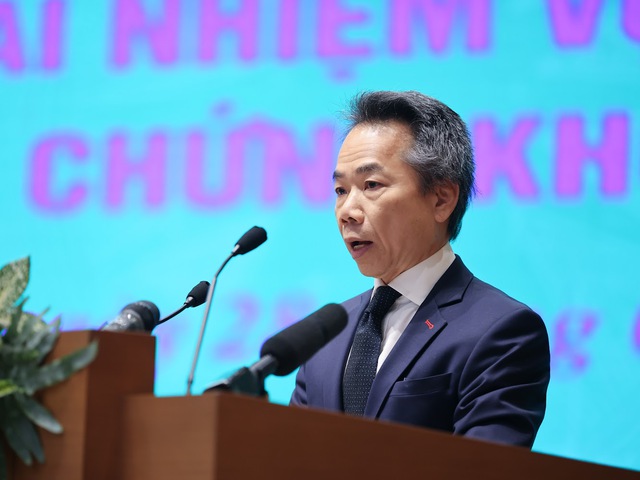On February 28th, in Hanoi, Prime Minister Pham Minh Chinh chaired a conference to implement the tasks of developing the stock market in 2024. At the conference, the Chairman of Ho Chi Minh City Securities Corporation (HSC), HOSE: HCM) delivered a speech on upgrading the Vietnam stock market.

Mr. Johan Nyvene – Chairman of HSC Securities (far right) speaking at the conference on Implementing the Tasks of Developing the Stock Market in 2024 held on February 28th, 2024
|
The scale of the Vietnam market is now on par with emerging markets.
According to the Chairman of HSC Securities, the Vietnam stock market has developed and grown in stages, both in terms of quality and quantity, for nearly a quarter of a century. Although still considered a frontier market by global market rating organizations, the Vietnam stock market has received very positive evaluations from foreign institutional investors in recent years and has been compared on an equal footing with some other emerging markets in the emerging market category.
This has been evidenced by some foreign investment funds that typically specialize in investing in emerging markets also starting to research and invest in the Vietnam stock market.
The Vietnam stock market currently accounts for the highest proportion in frontier market indices, up to nearly 30% in the MSCI frontier market index and 38% in the FTSE Russell index. The other markets in the frontier market category have a proportion of less than 10%.
With market capitalization and liquidity, the Vietnam stock market has also outperformed many other markets in the emerging market bloc. The total market capitalization of listed companies on the stock exchanges in Vietnam at the most recent time has reached nearly 200 billion USD, surpassing many other Asian markets such as the Philippines, Qatar, Kuwait, as well as European markets such as Greece, Czech Republic, Hungary… and can be compared with the market capitalization of some emerging markets like Thailand at 475 billion USD, Indonesia at about 720 billion USD, and Malaysia at about 390 billion USD.
In terms of trading liquidity, the Vietnam stock market has achieved an average trading liquidity fluctuating at or below 1 billion USD in the past two years and most recently reached nearly 700 million USD, equivalent to Indonesia, Malaysia, and Singapore, ranking second only to Thailand within the ASEAN bloc.
Once Vietnam is upgraded to a new emerging market, the stock market in particular and the Vietnamese economy in general will benefit in many aspects such as enhancing global integration, elevating the status and position of the Vietnamese market. According to research and estimation by the World Bank, upgrading to a new emerging market capability could bring an additional 10 billion USD of indirect new investment to Vietnam.
With the market being upgraded, companies will have more opportunities to access potential foreign investment capital. The Vietnam stock market will become more attractive to investors and receive large capital inflows from investment funds around the world.
Investment capital from abroad through open-end funds, exchange-traded funds (ETFs) referencing MSCI and FTSE indices is expected to find its way to the Vietnam stock market on a large scale. In addition, the stock market’s upgrading is also linked to the story of Vietnam’s aim to establish an international financial center.
“Clearly, this is a large part of Vietnam’s national development strategy,” affirmed Mr. Johan Nyvene.
Improving foreign investor’s market access to upgrade the market
According to the Chairman of HSC, the Vietnam stock market has met the majority of MSCI and FTSE’s criteria for market upgrading. However, most recently in the fourth quarter of 2023, through direct contacts between market members and SSC with MSCI and FTSE, these rating organizations have raised some specific criteria to guide regulatory bodies and market members to make progress faster. Among these criteria, there are three important conditions that the Vietnam stock market still needs to meet.
 Mr. Johan Nyvene – Chairman of HSC Securities: “The Vietnam stock market has met the majority of MSCI and FTSE’s criteria for market upgrading”
|
First, expand and not restrict the foreign ownership ratio in Vietnamese companies. This restriction is reflected because some securities in industries such as banking, retail, technology… still have restricted foreign ownership ratios but are receiving a lot of attention from foreign institutional investors and are now out of room.
However, besides industries with specific factors related to national financial security or high-tech security, the legal framework of the Vietnam market has allowed companies to open up foreign ownership ratios up to 100% for businesses not subject to business field conditions. So the proactivity in expanding foreign ownership ratios lies in the hands of most listed companies.
The fact that the Vietnam stock market has not been upgraded to an emerging market is not due to scale and liquidity factors but mainly due to factors related to foreign investor’s market access.
Second, adjust or abolish the requirement of pre-trading deposits, especially for foreign institutional investors. Determining this risk needs strong financial resources and lots of experience from brokerage companies with foreign institutional investors, along with cooperation from foreign depository banks to jointly solve it. Regarding this criterion, recently leading securities companies, including HSC, together with foreign depository banks, have urgently cooperated to research and propose specific methods to minimize risks in removing pre-trading deposit requirements, in order to create the most convenient investment and payment conditions for foreign institutional investors.
Third, improve and strengthen the disclosure of information in English, from regulatory bodies, listed companies, and market members. This is a group of work that can be deployed soon with the condition that needs good communication with listed companies for them to understand the benefits of information disclosure in English and actively update information. With stricter regulations and supervision from SSC and stock exchanges, more comprehensive English information disclosure is certainly a criterion with a high feasibility.
In addition to the main conditions mentioned as prerequisites, foreign institutional investors as well as MSCI and FTSE have also outlined some other criteria that the Vietnam stock market can further improve to continue progressing towards becoming a higher-end market in the eyes of investors, including criteria such as:
Liquidity: The stock market needs to have sufficient liquidity, meaning the ability to buy and sell stocks and financial assets easily and effectively.
Transparency and corporate governance standards: Listed companies need to comply with transparency standards in financial reporting and corporate management.
Development of infrastructure and associated financial services: The market needs to have developed infrastructure, including trading systems, derivatives financial services, and other support tools to support trading activities.
And finally, strengthen training and enhance investment awareness, especially for individual investors.












